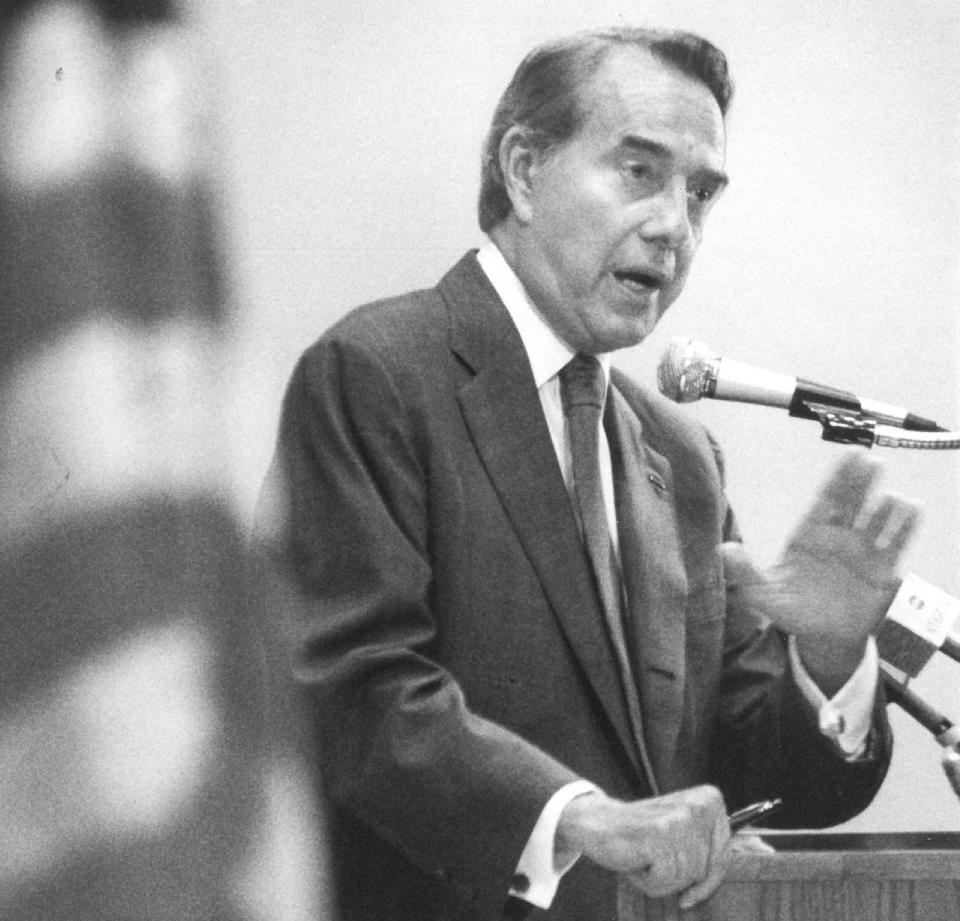Bob Dole's constant pen in hand was reminder of war injury, advocacy for disability rights
TOPEKA, Kan. – For those who know former U.S. Sen. Bob Dole closely, they know not to lean in to shake the right hand of the esteemed Republican statesman.
For those not as familiar, Dole helps them out by keeping a pen in that hand whenever he is out in public. The pen served two purposes — a kind, subtle gesture to discourage people from shaking it, and a therapeutic remedy to an injury that changed Dole’s life forever.
Dole died in his sleep Sunday at the age of 98, according to an announcement from the Elizabeth Dole Foundation. He announced earlier this year that he was battling advanced lung cancer.
Dole has a history of battling wounds and health issues dating back to his military service during World War II.
Obituary: Bob Dole, former GOP presidential candidate and longtime senator, dies at 98

A native Kansan, Dole as a young adult was briefly a student-athlete on the University of Kansas’ football, basketball and track teams when in December 1941, he heard over the radio that Pearl Harbor had been bombed. A year later, he enlisted in the U.S. Army’s Reserve Corps, leaving for active duty in June 1943.
Rotating around several U.S. camps and attending the Officers Candidate School at Fort Benning in Georgia, Dole deployed to Italy as a second lieutenant in the Army’s 10th Mountain Division in late 1944.
But just a few months into that deployment, Dole on April 14, 1945, led an assault on Hill 913 north of Castel D’Aiano, with the soldiers taking heavy artillery and aerial fire. When he saw a fellow soldier go down, Dole went to help pull him into a manhole, and as he scrambled out, he felt a sharp sting in his shoulder.
More: A timeline of Bob Dole's life: War hero, Republican leader, presidential candidate
Susan Page's appreciation: A belief in hard work, an aversion to big talk and Kansas roots he never lost: Bob Dole's abiding legacy
Dole collapsed onto the battlefield, and it was nine hours before medics could evacuate him to a field hospital. He would spend the next two and a half years at the Percy Jones Army Medical Center in Battle Creek, Mich., in a head-to-hip plaster cast, having lost a kidney and full use of his right arm.
"For nearly a year, I couldn't feed myself. I had to learn to walk and dress myself all over again," Dole previously told The Topeka Capital-Journal.

For his sacrifices, Dole received two Purple Hearts and a Bronze Star with Oak Leaf Cluster. But it was the use of his right arm and hand that he so desperately sought to restore, undergoing extensive therapy and seven failed surgeries.
Those experiences that hardened Dole, and they were experiences he never hid but instead used in relating to disadvantaged Americans as a U.S. senator and as the Republican nominee in the 1996 U.S. presidential race. During that failed campaign for president, Dole told the New York Times that he hoped to serve as an inspiration to people with disabilities and to help make the world a more accessible place.
He also in 1983 created the Dole Foundation to help provide for and support programs for those with disabilities, and the foundation played a large role in securing passage of the 1990 Americans with Disabilities Act.
And for all the adversity Dole faced from that fateful day in Italy, it kick-started an ethic that propelled him to the forefront of U.S. politics — an ethic perhaps best symbolized by the pen in his right hand.
“In moments of self-pity, I saw myself going through life unmarried, selling pencils on street corners and living off a disability pension," Dole told The Capital-Journal. "(Dr. Hampar Kelikain) was frank to say that it would be up to me to make the most of what I had. There would be no miracles."
Dole's perspective: At 98 and facing cancer, Bob Dole reckons with legacy of Trump and ponders future of GOP
This article originally appeared on Topeka Capital-Journal: Why WWII army veteran Bob Dole always carried a pen in his right hand

 Yahoo Movies
Yahoo Movies 